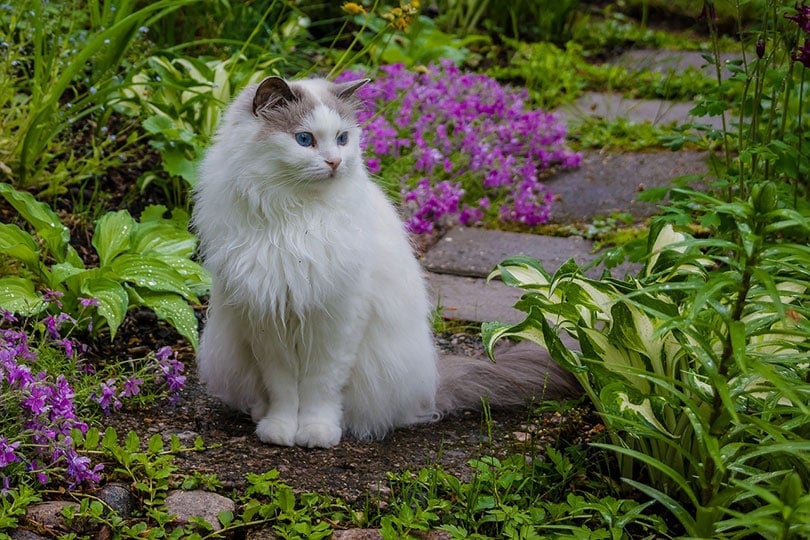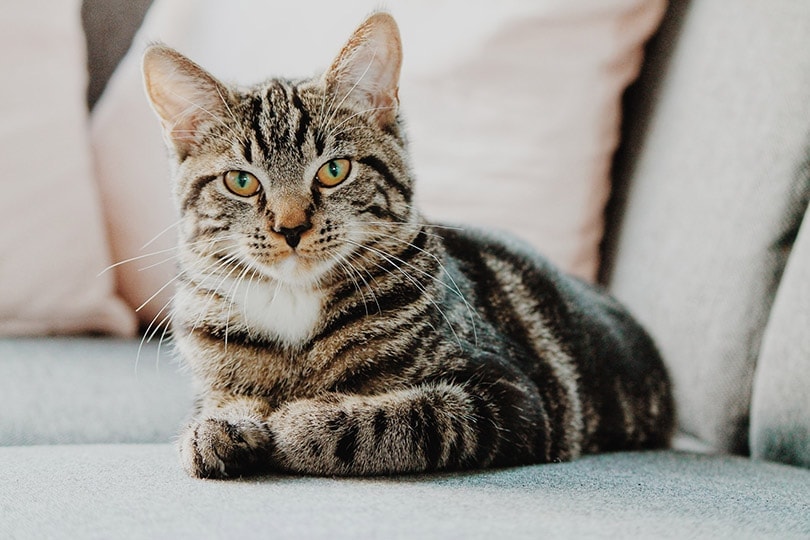Cats love to curl up in small, comfortable spaces away from the hustle and bustle of daily life. If you’re a cat owner, there’s no doubt that you’ve found your feline friend curled up in a box, cupboard, under the bed, or in another enclosed space. You may have even spent a great deal of time frantically searching for your seemingly missing cat only to find them peering out at you from their secret hiding spot!
Hiding is part of a cat’s normal behavior. This behavior stems from the fact that cats have evolved to be both predators and prey. Hiding is one of the survival tactics that cats used in the wild to conceal and protect themselves from larger predators such as owls. A cat will also hide themselves while stalking prey like mice and small birds. Even though your cat may live indoors in a safe space and no longer have to hunt for a meal, this survival trait has persisted.
Hiding can be a relaxing activity for a cat as it gives them a sense of safety and security. Cats, like people, have different personalities and some cats hide more than others. However, when a cat changes their hiding behavior or starts hiding for prolonged periods of time, it may be a sign that something is wrong. Cats commonly hide due to stress or health issues, such as illness or pain. Pregnant female cats may also start hiding the week before giving birth.
3 Reasons Cats Hide
1. Stress
Cats are sensitive to changes in their environment. When cats encounter someone or something unfamiliar, or when they are introduced to a new environment, it is normal for them to hide. A new home, unfamiliar guests, new members of the family, and new animals may all be perceived as sources of potential danger to a cat. Hiding makes a cat feel safe from the perceived danger. Don’t force a cat out of their hiding spot if they are stressed as this may make them feel more insecure and make the problem worse. Stress hiding is usually short-lived and your cat should re-emerge once the source of stress is gone or when he or she has adjusted to the change and feels comfortable again.
Hiding caused by stress is a problem when it continues for long periods of time or interferes with a cat’s normal day-to-day activities like eating, drinking, or using the litter box. Stress experienced over long periods can weaken a cat’s immune system and cause them to become ill. If your cat hides for prolonged periods of time, it is advisable to get them checked by a vet.
Hiding may be accompanied by other signs of chronic stress such as urinating outside of the litter box or over-grooming. A usually relaxed cat may show signs of aggression when stressed. Be sure to mention any behavioral changes to your veterinarian.
If your vet rules out a health issue, they can refer your cat to a behavior specialist for an assessment and advice.
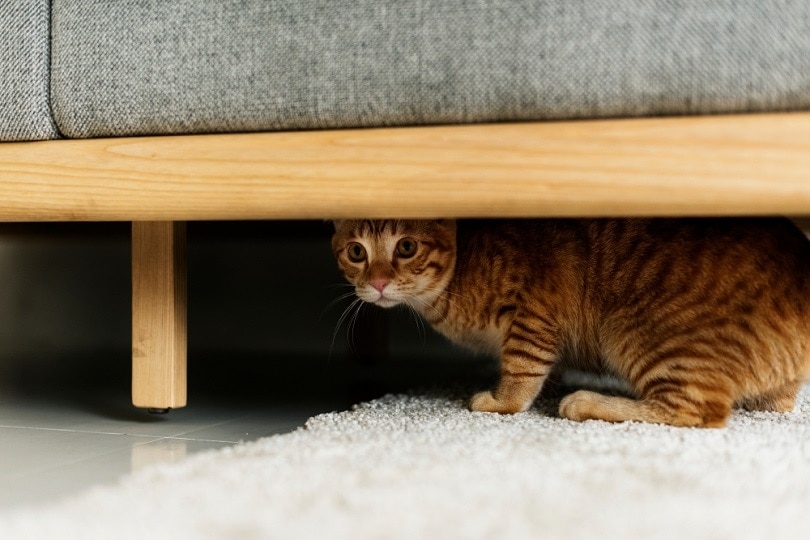
2. Health Issues
In the wild, weaker animals are vulnerable and easy targets for predators. When injured or ill, cats in the wild will hide to protect themselves from predators. This instinct remains in cats even as they have become domesticated.
Cats instinctively hide illness and pain, and any health issue can cause a cat to hide. Gastrointestinal issues, kidney disease, dental disease, and infection can all make a cat feel unwell or in pain.
Vomiting or diarrhea, discharge from the eyes or nose, coughing, sneezing, and a lack of appetite are some of the other signs that a cat isn’t well. However, hiding is frequently the only sign that a cat is ill so when a cat hides and their environment hasn’t changed, you need to take it seriously and get them checked by a veterinarian.
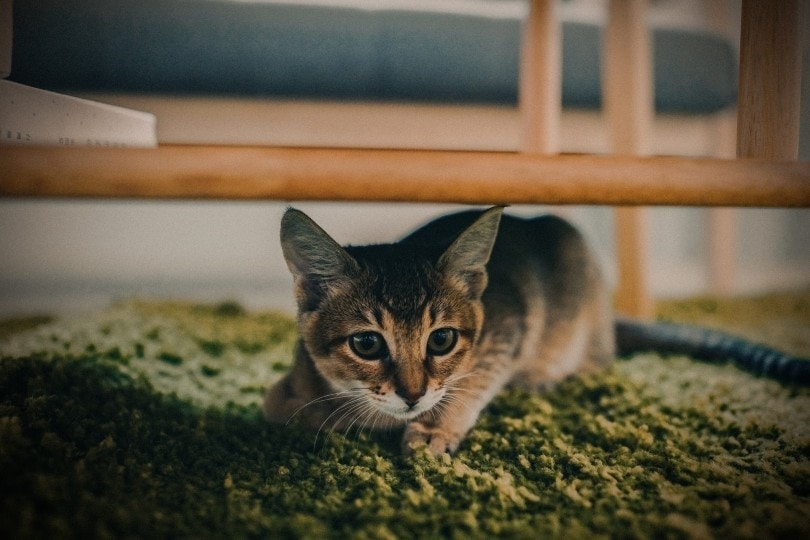
3. Impending Birth
A pregnant queen will start seeking out a safe and quiet space about a week before she is due to give birth. At this stage of her pregnancy, her nipples may also be enlarged and she may have a pendulous abdomen. An unspayed female cat who starts hiding more than usual should be checked by a veterinarian.
If your vet suspects that your cat is pregnant, they may want to perform an ultrasound or X-rays to confirm. If your cat is indeed pregnant, your veterinarian will be able to give you advice on how best to prepare for the birth.
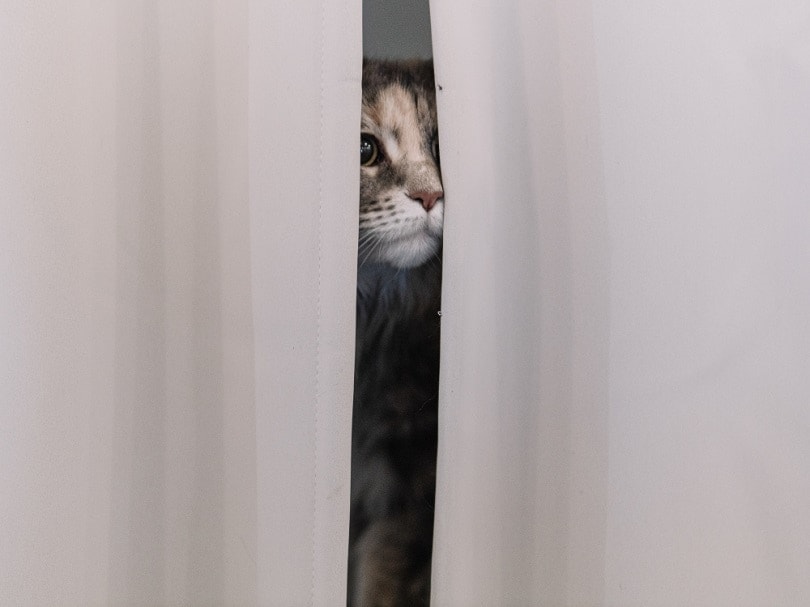
Creating a Safe Hiding Spot For Your Cat
All cats benefit from having a safe space in which to hide if they feel threatened or need some time to relax.
Cats generally choose hiding areas that are private and secure. They tend to choose spaces that are totally enclosed or partially enclosed with a gap to look out from. Some cats enjoy elevated hiding spots from which they can observe the world. They also enjoy hiding in places with familiar smells like a laundry basket or on top of folded clothing in your cupboard. Older arthritic cats may prefer a spot closer to the ground as jumping may be too painful for them.
Make sure that there are enough hiding spots available for all the cats in your household so that they don’t have to compete for resources. Open cupboards, the space under a bed or behind a sofa, boxes, or cat cocoons are all good options for hiding spots. You can make existing hiding areas more attractive to your cat by placing a soft blanket for them to lie on. Cats will generally find their own hiding spot without your help though. A cat may sometimes choose a hiding spot that is dangerous. Cats have been known to curl up in dryers and on the warm engine of a car. It is important to block access to these potentially dangerous areas.
In Summary
Hiding is a normal behavior in cats. The key is to know what is normal for your particular cat. If your cat starts hiding more than usual it can be a sign that there is an issue and it is best to get them checked by a veterinarian.
Featured Image Credit: Chendongshan, Shutterstock




